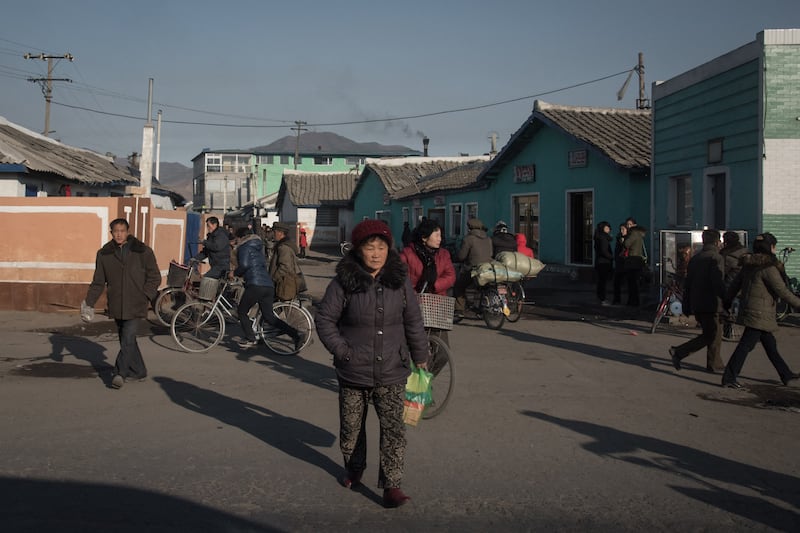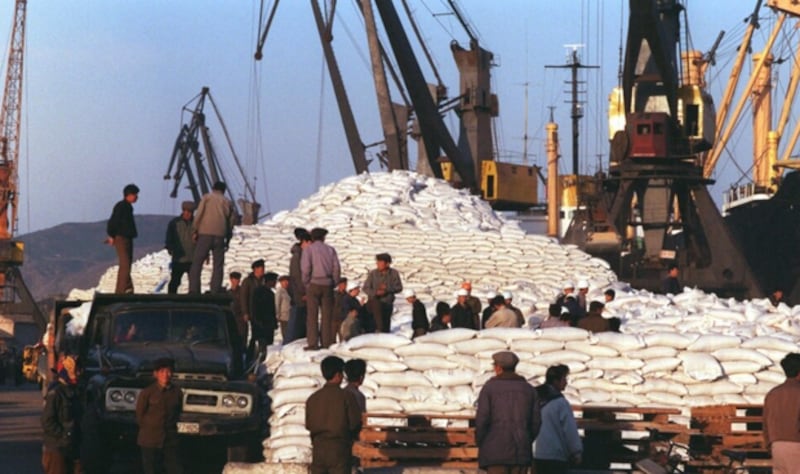Read a version of this story in Korean
North Korea has begun distributing Russian flour rations to factory workers in war-relevant industries, raising suspicion that Moscow is sending food in exchange for military support in its war with Ukraine.
North Korean troops began arriving in Russia last month, and Pyongyang is known to have earlier sent shipments of artillery shells. These developments have come after a period of warming ties between the staunch Cold War allies, as both become more and more isolated by the international community.
The sacks of flour, with labels written in the Cyrillic alphabet, were given to steel workers in the northeastern province of North Hamgyong, a resident there told RFA Korean on condition of anonymity for personal safety.

“The Russian flour came in 2-kilogram (4.4-pound) paper bags,” he said. “These yellow paper bags, with Russian letters written on the outside, were distributed to each worker as a monthly ration.”
Food shortages
North Korea suffers from chronic food shortages and is unable to produce enough grain to meet its minimum requirements to feed its population.
Wi Sung-lac, a South Korean lawmaker who was once the country’s ambassador to Moscow told the Seoul-based Korea Herald newspaper that North Korea says it produces 4 million tons of grain each year, but it needs about 5 million to feed everyone.
He said that if Russia would help bridge the gap then entering the war with Ukraine would be “not a bad deal at all” for North Korea.
Although the daily food ration for workers in North Korea is defined as 700 grams (1.5 pounds), each worker was given eight bags of flour, meaning the actual daily ration is slightly less than 540 grams (1.19 pounds), the resident said.
“Some people said that it was because we sent artillery shells to Russia and this is why we received flour in return,” he said. “Rumors are also spreading that this is clearly compensation for sending our soldiers to the Russian battlefield.”
Though Ukraine, the United States, South Korea, NATO and others have confirmed that North Korean troops have been dispatched to Russia, Pyongyang has not officially confirmed this, and has attempted to prevent the news from spreading internally by punishing people for spreading “rumors.”
Bad trade
“These days, diplomatic issues between us and Russia are always a topic of discussion because of the Russian flour,” the resident said. “Some don’t agree that we should be sending weapons and troops to Russia, and they express antipathy to the authorities' military-first politics.”
He said that the residents feel like it is a bad trade.

“They say they can tolerate hunger, but they cannot tolerate sending their children to war,” the resident said. “It is no longer a secret that our country dispatched our children to the Russian battlefield and their lives are at risk.”
RELATED STORIES
North Korea hunting for source of reports on soldier deployment to Ukraine conflict
Biden lets Ukraine use long-range US missiles to hit Russia, North Korea troops
Ukraine reveals ‘intercepted’ radio communications of North Korean soldiers in Russia
A resident in the northern province of Chagang told RFA that the Russian flour could be purchased at the government-run grain sales office.
“The flour was distributed to munitions factory workers and then they suddenly appeared on the market,” he said, adding that each worker in the munitions industry was given a month’s supply.
But it wasn’t clear to anyone how or why the flour is being imported, he said.
“Residents understand that Russian flour is distributed in change for weapons production, especially considering that it was the munitions factory that got it,” the second resident said.
“Some ask if the lives of our young soldiers are being exchanged for this flour.”
Translated by Claire S. Lee. Edited by Eugene Whong.
